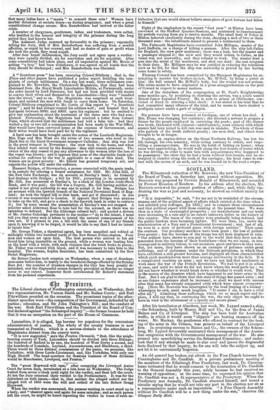SCOTLAND.
The Kilmarnock reelection of Mr. Bouverie, the new Vice-President of the Board of Trade, on Saturday last, passed without opposition. Mr. Bouverie was proposed by Provost Donald of Kilmarnock, and seconded by Provost Houston of Renfrew. In his address after the election, Mr. Bouverie reviewed the present position of affairs ; and, while fully vin- dicating the war as just and necessary, he showed an evident anxiety for peace. " It is impossible," he said, " for me not to be reminded of the circum- stances and of the political aspect of affairs which existed at the time when I last solicited your suffrages, [in 1852,] and to compare those circumstances and that political aspect with those existing at the present time. We were then in a state of unexampled prosperity ; our manufactures and our trade were increasing at a rate and to an extent unknown before in the history of this country. The taxes of the country were gradually being reduced, and the public burdens were becoming lighter. We were then, too, under the administration of a Tory and a Protectionist Government ; and, last of all, we were in a state of profound peace with foreign nations." Then came. the contrast. Our pecuniary sacrifices have been great ; the loss of gallant lives greater ; but the heroism of the troops has not been displayed in vain. " Our soldiers have shown to you and to the world that they have not de- generated from the heroism of their forefathers—that we are equal, in true oourageand in military valour, to our ancestors, great and brave as they were. But, yet more, they have shown us an example of patience under great sufferings, and of endurance under the bitterest privations, in which they have exhibited a still greater heroism, and displayed all those characteristics which exalt mankind even more than courage and bravery in the field. It is a complicated machine an army ; and we have not had that machinery at work since the war of the French Revolution. We had to put it in action at once, and until we tried we did not know where the weak parts lay ; we did not know whether it would break down or whether it would work. That is the source of the disasters which have happened to our brave army in the East. But I am glad to think that this state of things has passed away ; and as our future experience shall be increased, so shall we meet with success after that army has already conquered evils which were almost overpower- ing. [Here Mr. Bouverie was interrupted by the loud braying of a donkey : whereupon he said, amid much laughter, "It seems I am to have a rival after all."1 Admitting these sufferings, which we so much regret and de- plore, I will say that, in continuing the war, the only object we ought to have in view is the attainment of a speedy and secure peace."
After his installation at Aberdeen, last week, Mr. Layard named a ship, —the Schomberg, built by Messrs. Hall and Co., for the firm of James Baines and Co. of Liverpool. The ship has been built for Australian traffic, in which it would seem "clippers" are beating steamers off the water. Mr. Mackay, the gentleman who offered to contract for the feed- ing of the army in the Crimea, was present on behalf of the Liverpool firm. In proposing success to Baines and Co., the owners of the þ- berg, Mr. Layard favourably contrasted their management of the Austra- lian emigration with the GovernMental management of the war. He also pressed into speechifying service the Sebastopol Committee; and under- took that if any attempt be made to slur over and ignore the disgraceful facts disclosed by that inquiry, he for one will take the subject up, and not let it be conveniently forgotten.
An old quarrel has broken out afresh in the Free Church between Dr. Cunninghame and Dr. Candlish. At a private preliminary meeting of the members of the Edinburgh Free Presbytery, last week, Dr. Cunning- hame intimated that he would consent to the nomination of Dr. Candlish to the General Assembly this year solely because he had received no warning of opposition; at the same time, ho expressed his opinion that Dr. Candlish was not a fit representative of. the. Presbytery. When the Presbytery met formally Dr. Candlish absented himself, and issued a circular saying that he would not take any part in the election nor sit as a representative under such an imputation. "A Free Church Assembly without Dr. Candlish will be a new thing under the sun," observes the Glasgow Daily Hail.


























 Previous page
Previous page